Results
-
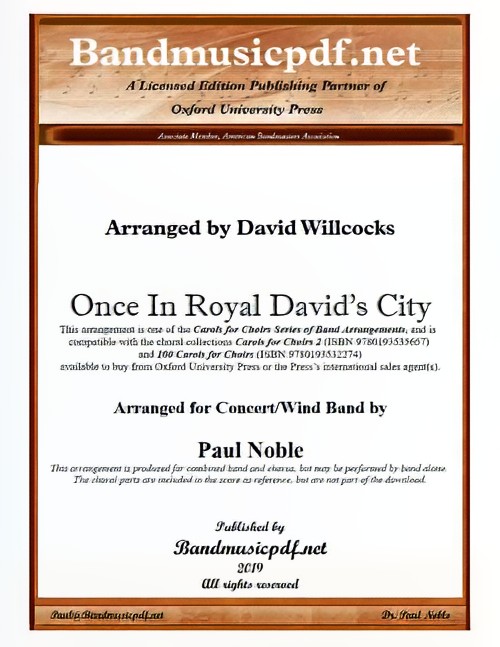 £75.00
£75.00Once in Royal David's City (Concert Band with Optional Choir - Score and Parts) - Noble & Willcocks
Once in Royal David's City is a Christmas carol originally written as a poem by Cecil Frances Alexander. The carol was first published in 1848 in her hymnbook Hymns for Little Children. A year later, the English organist Henry John Gauntlett discovered the poem and set it to music. According to The New Oxford Book of Carols, the text was conceived by Cecil Alexander after overhearing a group of her god children complaining about the dreariness of the catechism. Cecil masterfully took doctrines from the Apostle's Creed and simplified them for her hymns. Cecil wrote about 400 hymns in her lifetime, among which are All things bright and beautiful and There Is a Green Hill Far Away. She used the money for charitable purposes, and was a tireless advocate (and visitor) of the poor and sick. Henry John Gauntlett had spent the first half of his career as a lawyer before abandoning his practice to pursue music. He served as the organist at a number of leading London churches. Gauntlett was a prolific writer and is said to have composed over 1000 hymn tunes. He made tremendous contributions to the world of music, even inventing mechanical improvements to the organ. As a result, he was praised by the famous Felix Mendelssohn and was awarded an honorary doctorate in music from the Archbishop of Canterbury. In 1919, Arthur Henry Mann, organist at King's College (1876-1929), introduced an arrangement of Once in Royal David's City as the processional hymn for the service. In his version, the first stanza is sung unaccompanied by a boy chorister. The choir and then the congregation join in with the organ on succeeding stanzas. This has been the tradition ever since. It is a great honor to be the boy chosen to sing the opening solo--a voice heard literally around the world. In this arrangement for band accompaniment, the first five verses may be performed as directed by the conductor, with different groupings of instruments for each verse, i.e., Vs.1, A cappella; Vs. 2, Fl., Oboe, E.H., Bsns; Vs. 3 Cl., Saxes; Vs. 4, Brass; Vs. 5, All, and Vs. 6 as written with featured descant. This arrangement is one of the Series of Band Arrangements compatible with the David Willcocks Carols for Choir, Book 2 (#31).
Estimated dispatch 7-14 working days
-
£64.95
The Poppy Red (Concert Band Accompaniment - Score and Parts) - Park, Owain
Commissioned by the Military Wives Choirs to commemorate the centenary of 1918, the end of the First World War. The Vocal score is available separately - NOV167387-01To mark the centenary of the end of World War I, the Military Wives Choirs - 69 choirs from across Britain and abroad - commissioned Owain to write a piece for their album, 'Remember'. The text for Owain's work, 'The Poppy Red', is inspired by the 1918 poem 'We Shall Keep The Faith' by Moina Michael, itself inspired by John McCrae's 'In Flanders Fields'. The recording brought together 1105 voices with The Band of the Household Cavalry, conducted by Hilary Davan Wetton.
Estimated dispatch 7-14 working days
-
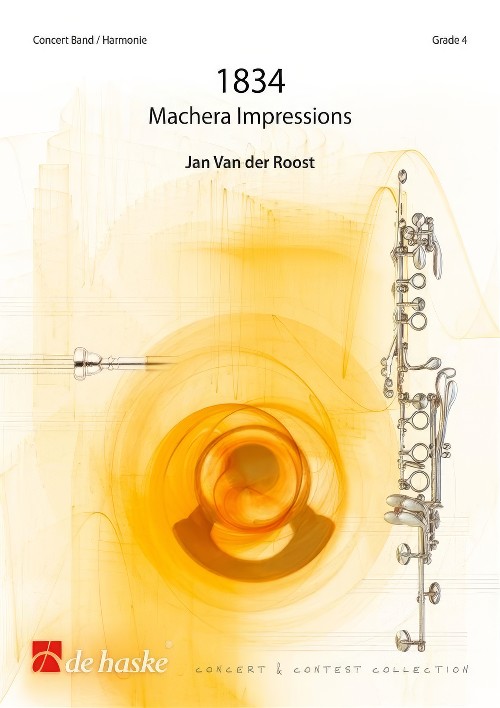 £159.99
£159.991834 (Machera Impressions) (Concert Band - Score and Parts) - Van der Roost, Jan
The twofold title of this concert work is directly connected with the band who commissioned it. The 'Harmonie Municipale Grevenmacher' - from the town of the same name, by the river Moselle in the Grand Duchy of Luxembourg - was founded in the year 1834. The name Machera is derived from the word machara, which in turn originated from maceries (old wall). Later, Machera evolved into Machern, Grafenmachern, and finally Grevenmacher. In 2009, this music society - the third oldest still in existence in the country - celebrated its 175th anniversary. And after all these years the society still flourishes! The dynamic committee, led by Georges May, fully supports and inspires the musical leader of the band, Claude Weiland, as well as his 60-strong ensemble. This well-functioning team took the initiative to ask Jan Van der Roost to write an anniversary composition, inspired, on the one hand, by the rural character of Grevenmacher and its surroundings (where the famous Moselle wine growing dominates the countryside), and on the other hand, by the dynamics, creativity and joie de vivre the band exudes. All of this resulted in a twofold work with alternating peace and excitement, virtuous and melodic features, orchestral splendour and soberly orchestrated passages. The premire, on 10 January 2010, was conducted by the composer himself at a successful gala concert which brought a fine year full of musical festivities to a close. The 'Harmonie Municipale Grevenmacher' faces the future with confidence, and will now prepare for its next milestone: the 200th anniversary!Duration: 11:00
Estimated dispatch 7-14 working days
-
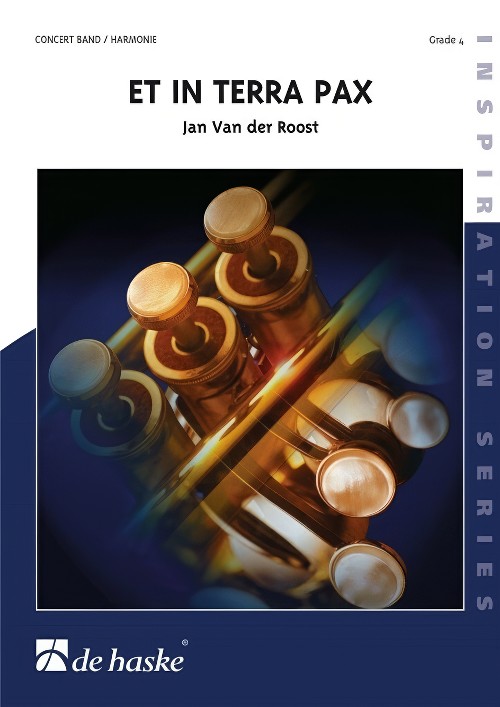 £174.99
£174.99Et in terra Pax (Concert Band - Score and Parts) - Van der Roost, Jan
This piece was commissioned by the Concert Band Vlamertinge and is a plea for peace: the title translates as Peace on Earth. This is expressed by means of the vocal contribution expected from the performers. In various places of the piece you can recognize, the words Et In Terra Pax, an appeal for peace, at first jumbled together but later more rhythmically structured, developing into synchronized massed voices. The work starts with a pentatonic theme based on the notes D, E, G, A and C (taken from 'ConCErtbAnD VlAmErtinGE' and the name of the conductor, NiCk VAnDEnDriessChe). A somewhat sad melody is developed during an orchestral climax which leads to the first explosion of sound (measure 62 onwards). Suddenly the opening measures are recaptured, albeit with a differently coloured sound: the words Et in Terra Pax bring the first movement to a close. A restless Allegro follows which abruptly stops and is replaced by a calming chorale-like passage. A narrator reads aloud the poem 'Sonnet' by the young poet Charles Hamilton Sorley, who was killed during World War I. This poem fittingly puts into words the cruelty and senselessness of war. After the expanded recapitulation of the allegro, the broad, almost infinite atmosphere of the beginning returns. Clarinet and English horn play the pentatonic opening theme once more, this time broadly, while the words Et in Terra Pax are repeated again and again by the rest of the ensemble. The composer has purposely avoided all forms of aggression and bombastic sounds regularly used in works about war. Fear of violence and destruction can be heard and felt during the allegro passages. The charged opening makes way in the end for hope: May peacefulness replace cruelty in everyday life, too.Duration: 13:45
Estimated dispatch 7-14 working days
-
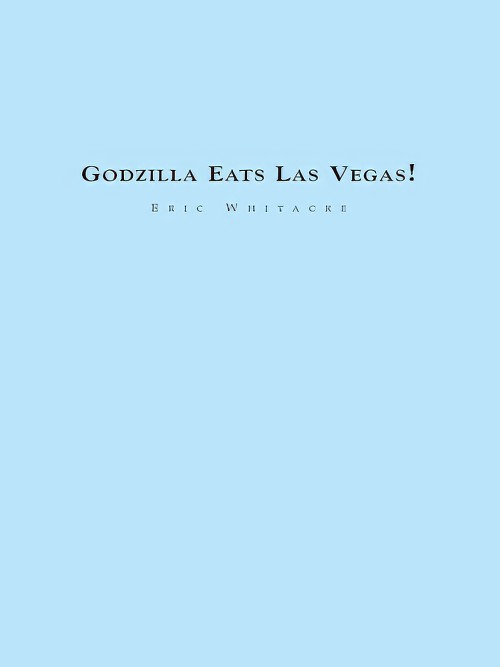 £189.99
£189.99Godzilla Eats Las Vegas (Concert Band - Score and Parts) - Whitacre, Eric
Note from Composer:It took me seven years to get my bachelor's degree from the University of Nevada, Las Vegas. By the time I graduated I was ready to eat Las Vegas.Tom Leslie asked me to write another piece for the group as I was leaving, and I thought it would be a blast to do something completely ridiculous. The players are called upon to scream in terror, dress like Elvises (Elvi), and play in about thirty different styles from mambo to cheesy lounge music. The audience follows a script that I wrote simulating a campy, over the top Godzilla movie (is there any other kind?).I wrote the bulk of the piece while in my first year at Juilliard, and no kidding, I used to act out the script every morning devouring animal crackers, wreaking havoc all over the breakfast table. The script was originally twice as long, and had an entire subplot devoted to a young scientist and his love interest. As I started to finish the piece, however, it didn't seem that funny and that story (along with an extended Elvis tribute) ended up on the cutting room floor.The idea that this piece is being played all over the world in such serious concert venues is the single funniest thing I have ever heard. It has been played on the steps of the Capitol by the United States Marine Band, by the Scottish National Wind Symphony (they play in kilts, so help me God), and I have a video of a Japanese audience visibly confused and shaken by the whole experience. Can you imagine? I'm laughing my head off even as I write this!Godzilla Eats Las Vegas! was commissioned by the University of Nevada Las Vegas, Thomas G. Leslie, conductor, and received its premiere November 28th, 1996.The performers are encouraged to go crazy: wear showgirl costumes, Elvis costumes, act out scenes on stage, use video and lighting - anything to get a laugh.
Estimated dispatch 7-14 working days
-
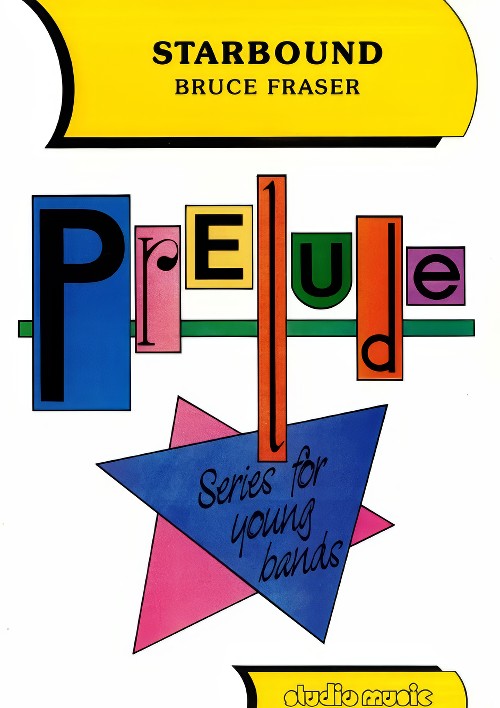 £44.95
£44.95Starbound (Concert Band - Score and Parts) - Fraser, Bruce
Starbound is a strong, driving piece and relies on good rhythmic playing from the bass instruments. It is a good introduction to playing triplets for all sections of the band and this could be introduced in the preliminary exercise. The trumpet solo could be played by the whole section if preferred.Titles in the Prelude Series are specifically scored for bands with few, if any, bass instruments but will sound well on larger ensembles. The bass line is playable by any combination of bass clarinet, bassoon, baritone saxophone, trombone, euphonium or tuba; in the event that none of these is available, the part for trombone/euphonium (B flat TC) can be played by tenor saxophone. The tuned percussion part is entirely optional and can be played by any available instrument(s). Each piece also includes a preliminary exercise. This is always in the same key as the accompanying piece and consists of a scale and chord progression that can be used for improving ensemble, balance, intonation and instrumental facility by changing tempo, articulation and dynamics.Duration: 1:45
Estimated dispatch 7-14 working days
-
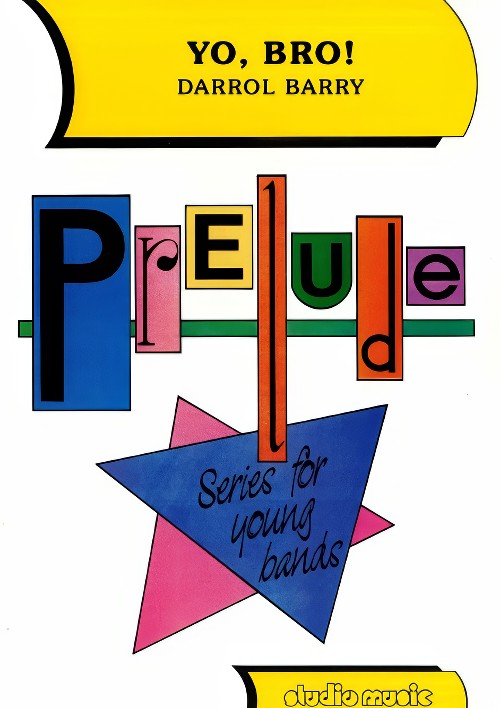 £44.95
£44.95Yo, Bro! (Concert Band - Score and Parts) - Barry, Darrol
Yo, Bro! has a Latin feel about it which requires good rhythmic playing with a strong beat supplied by the percussion.Titles in the Prelude Series are specifically scored for bands with few, if any, bass instruments but will sound well on larger ensembles. The bass line is playable by any combination of bass clarinet, bassoon, baritone saxophone, trombone, euphonium or tuba; in the event that none of these is available, the part for trombone/euphonium (B flat TC) can be played by tenor saxophone. The tuned percussion part is entirely optional and can be played by any available instrument(s). Each piece also includes a preliminary exercise. This is always in the same key as the accompanying piece and consists of a scale and chord progression that can be used for improving ensemble, balance, intonation and instrumental facility by changing tempo, articulation and dynamics.Duration: 2.00
Estimated dispatch 7-14 working days
-
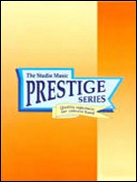 £184.95
£184.95PARTITA for Concert Band (Darrol Barry) (Prestige Concert Band - Score and Parts) - Barry, Darrol
This work is cast in four movements: Introit; Impromptu; Elegy (31.12.04); Finale. Grade 5. (Recorded on QPRM150D, CHIVALRY, Royal Northern College of Music Wind Orchestra) PARTITA FOR CONCERT BAND is cast in four movements: Introit - begins majestically with brass, saxes and percussion carrying the main theme from which most of the following ideas originate. It is repeated by the woodwinds and moves via a solo side drum into the piu mosso. New ideas are introduced by trombones, the horns and euphoniums leading to the central idea played by oboe. This leads, in turn, via full band to the closing movement. 2. Impromptu -once again the opening theme is the basis of the whole movement, using most of the composer's tricks, augmentation, retrograde, inversion and fugato, it moves along in a very confident style. A muted solo trumpet links into the third movement. Elegy (26/12/04) - this movement was prompted by the devastating events of Boxing Day 2004, the Asian Tsunami. The movement opens bleakly until a solo flute gives us the main theme over a troubled accompaniment. The opening mood returns but timpani and tam-tam herald return of the main theme for the full band. The opening theme is heard again as the music subsides but never settles. Finale - this spirited 6/8 vivo opens up with percussion and horns and trumpets announce the main idea, punctuated with short chords from the lower band. A new four bar theme is heard over a bass tread, the theme overlaps itself and quavers swirl up and down the band. Material from the first movement is heard transformed by the energy of the finale and the music surges towards a sudden close. Performance time: 15:35
Estimated dispatch 7-14 working days
-
 £44.95
£44.95PARTITA for Concert Band (Darrol Barry) (Prestige Concert Band - Score only) - Barry, Darrol
This work is cast in four movements: Introit; Impromptu; Elegy (31.12.04); Finale. Grade 5. (Recorded on QPRM150D, CHIVALRY, Royal Northern College of Music Wind Orchestra) PARTITA FOR CONCERT BAND is cast in four movements: Introit - begins majestically with brass, saxes and percussion carrying the main theme from which most of the following ideas originate. It is repeated by the woodwinds and moves via a solo side drum into the piu mosso. New ideas are introduced by trombones, the horns and euphoniums leading to the central idea played by oboe. This leads, in turn, via full band to the closing movement. 2. Impromptu -once again the opening theme is the basis of the whole movement, using most of the composer's tricks, augmentation, retrograde, inversion and fugato, it moves along in a very confident style. A muted solo trumpet links into the third movement. Elegy (26/12/04) - this movement was prompted by the devastating events of Boxing Day 2004, the Asian Tsunami. The movement opens bleakly until a solo flute gives us the main theme over a troubled accompaniment. The opening mood returns but timpani and tam-tam herald return of the main theme for the full band. The opening theme is heard again as the music subsides but never settles. Finale - this spirited 6/8 vivo opens up with percussion and horns and trumpets announce the main idea, punctuated with short chords from the lower band. A new four bar theme is heard over a bass tread, the theme overlaps itself and quavers swirl up and down the band. Material from the first movement is heard transformed by the energy of the finale and the music surges towards a sudden close. Performance time: 15:35
Estimated dispatch 7-14 working days
-
 £7.00
£7.00TUNES FROM THE TRENCHES (SSA vocal score) - Lawson, Peter
For SSA choir and orchestra or concert band, or choir and piano.A non-stop medley of tunes from World War One from recruiting through to the Last Post. This arrangement can be performed by a choir with either an orchestra, band or piano accompaniment. There are different choral versions available for Mixed Voice Choir - both SATB (GM131) and, for those with a shortage of male voices, SA+Men (GM134) - for Upper Voice Choir (SSA - GM132) and for Male Voice Choir (TTBB - GM133). The orchestra score and parts (GMCP020) can be used either on its own or to accompany a choir.The recruiting song "Your King and Country Want You" starts us off followed by "Goodbye, Dolly Gray" as the soldiers leave for war. "Belgium put the Kibosh on the Kaiser" is followed by some proper trench songs - various lyrics were improvised by the soldiers!! - "Three German Officers crossed the Rhine" and "They were only playing Leap-Frog". "The Bells of Hell go Ting-a-ling-a-ling" leads to strains of "Stille Nacht" recalling the Christmas truce. "When this Lousy War is Over" and "There's no place like Home" are balanced by "Land of Hope and Glory" before the Americans arrive with "The Caissons go Rolling Along" and "Over There". "It's a Long Way to Tipperary" brings us towards a rousing finish save for an optional "Last Post-lude" to end reflectively.
Estimated dispatch 7-14 working days
